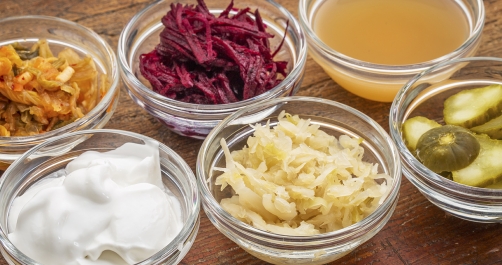Bloating is generally the result of not being able to digest foods properly. These not-so-digested foods end up feeling like they are just sitting around, causing discomfort and a general sensation of fullness. Bloating is also often accompanied by troublesome gas.
As we age, the production of hydrochloric acid declines, which is responsible for a major part of digestion and nutrient absorption. Parietal cells secrete around 2 liters of hydrochloric acid daily to establish the optimal pH for the effective function of digestive enzymes. This acid also kills bacteria and aids digestion by making food soluble. Sufficient hydrochloric acid (HCl) is critical for smooth digestion.
Unfortunately, the decline in HCl can have wide-ranging effects on all our digestion abilities “downstream,” which can result in bloating.
Bloating Cause #1:
Understanding that our bodies may become more sensitive to the fiber in certain fruits or veggies as we age, or when we introduce new ones into our diet, empowers us to make informed dietary choices. This awareness can help us manage and potentially reduce bloating
Pro Tip:
- Try chewing your vegetables more thoroughly or lightly cooking or steaming raw ones.
- If a fruit or veggie seems to be consistently related to bloating, try eliminating it for a few weeks and monitor your symptoms.
- Add prebiotic-containing foods to aid overall digestion and the effectiveness of the beneficial bacteria in the gut.
Foods such as apples, garlic, asparagus, leeks, bananas, Jerusalem artichoke, dandelion greens, chicory root, onion, and jicama are all high in prebiotic fiber.
Add in Just Better Prebiotic Fiber for quick and amazing results in reducing bloating, abdominal weight gain, improved bowel movements, decreased cholesterol and triglycerides.
Bloating Cause #2:
Decreased stomach acid can reduce the activation of a key protein-digesting enzyme called “pepsin.” This means the proteins you eat are inefficiently broken down and can pass through your system somewhat “undigested”.
Pro Tip:
- Consider reducing the amount of animal-based foods you eat and monitor your symptoms.
- Start by having one vegetarian meal per day and increase from there.
- Download one of my plant-based menu plans here.
Add Apple Cider Vinegar to increase the production of HCl. Begin with 1 tbsp. in water for 20 minutes before a meal.
Add a Digestive enzyme with HCl to aid in the proper digestion of proteins, fats, and carbohydrates. My favourite is Digestzymes—take 1-2 capsules with each protein-containing meal.
Bloating Cause #3:
If your digestive system slows down, bowel movements become challenging, and constipation occurs, bloating will certainly follow!
Causes of constipation include:
- Lack of dietary fiber
- Insufficient water intake
- Sedentary lifestyle
- Food sensitivities
- Compromised microbiome
- SIBO (see below)
- Parasites
- Candida
- Mold toxicity
- Magnesium deficiency
Ginger aids digestion and can reduce nausea in some cases. Peppermint has been found to help your digestive muscles effectively push food through the digestive system, allowing for an improved transit time.
Pro Tip: Drink a digestive tea like peppermint or ginger. See my recipe below.
Add a therapeutic, multi-strain probiotic and 3 capsules of Magnesium citrate at bedtime to restore normal bowel function.
Bloating Cause #4:
Poor digestion puts extra stress on all digestive organs, especially the large intestine. The large intestine is home to all your wonderful gut microbes with SO many bodily functions. The problem is that undigested food can feed the not-so-great microbes when it enters the large intestine. These “unfriendly” bacteria produce waste material and gas as a part of their natural metabolism. The more unfriendly microbes you have in your system (they will multiply if they are constantly fed by undigested food in the large intestine), the more gas will be produced in the large intestine.
Pro Tip: Try eating more fermented foods. Fermented foods contain probiotics that will feed the good bacteria and microbes in your system and keep the bad guys at bay. This includes things like yogurt, kefir, sauerkraut, and kimchi (as long as these do not cause bloating for you). If you cannot tolerate dairy-based yogurt and kefir, dairy-free options are available, or you could make dairy-free versions.
By adding in a therapeutic, multi-strain probiotic, you can actively work towards re-establishing a healthy microbiome. This step can bring hope and optimism for improved digestive health.
Bloating Cause #5:
With reduced stomach acid, you also have a reduction of the “activation” of several of your digestive enzymes (protein-digesting pepsin being one of them). Certain enzymes need to be activated to go to work digesting your food. This usually happens with the assistance of stomach acid.
Pro Tip: Try an enzyme supplement to assist your body in digesting food while you work on re-establishing your production of stomach acid (a healthy diet and lifestyle can do this!). My favourite is Digestzymes—take 1-2 capsules with each protein-containing meal.
Bloating Cause #6:
SIBO, or small intestinal bacterial overgrowth, is a common underlying cause of symptoms of Irritable Bowel Syndrome, such as bloating, gas, diarrhea, constipation, and reflux. It is estimated that 80% of people with IBS have SIBO.
SIBO, small intestinal bacterial overgrowth, is defined as an increase in the number of bacteria and changes in the types of bacteria present in the small bowel. In most patients, SIBO is not caused by a single type of bacteria but is an overgrowth of the various types of bacteria that should typically only be found in the large intestine.
Symptoms of SIBO:
- Abdominal pain or cramping
- Chronic Illnesses such as fibromyalgia, chronic fatigue syndrome, diabetes, neuromuscular disorders, and autoimmune diseases
- Constipation
- Fat Malabsorption
- Gas, bloating, and diarrhea
- IBS or IBD
- Increasing food intolerances or sensitivities
- Leaky gut syndrome
- Rosacea and other skin rashes
- Vitamin and Mineral Deficiencies
Next Steps
If bloating is a severe problem for you, remember that you’re not alone. Seeking professional help to discover the root cause of your issues can provide reassurance and the support you need to manage your digestive health. Book an appointment here.
Over the years of working with thousands of patients, the most helpful Functional Medicine Lab Test has been the GI MAP test. This is the most comprehensive GI test available on the market. It has helped thousands of my patients get to the root cause of their chronic digestive issues.
This test maps out the entire GI system and includes markers like parasites, bacterial overgrowth, hidden gut infections, leaky gut, inflammation in the gut, enzyme production, bile flow, beneficial bacteria and h. pylori detection. Purchase your GI MAP test kit here and get to the root of your issues.
(Tummy Soothing Tea): Ginger Tea
Serves 1
- Fresh ginger root (about 2”)
- Hot water
- Lemon slices (optional)
- Raw Honey (optional)
- Pour the water into a saucepan and heat it on the stove.
- Grate the ginger root into the saucepan. Let it come to a boil, and then simmer for 3-5 minutes.
- Strain the tea into a cup with a fine mesh strainer and add lemon and/or honey as desired.
- Serve & Enjoy!
Tip: If you do not want to use a grater and strainer then you can peel the ginger and thinly slice it into your cup before adding boiling water. The pieces should be big enough that they will sink to the bottom.

